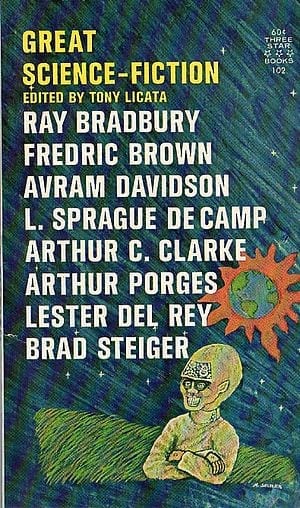
Science fiction has often predicted scientific advances, but what happens when scientists and sci-fi authors collaborate on visions of the future?
Hieroglyph, a new project from Arizona State University’s Center for Science and the Imagination and science fiction author Neal Stephenson, is working on an answer.
The modern science fiction landscape is clogged with dystopian fantasies: the battles of The Hunger Games, the eerie rent-a-human business of Dollhouse, the zombies of the Walking Dead, the (admittedly visionary) cyberpunk novels of William Gibson. At the same time, the rosy 1950s visions of a future with moon colonies and flying cars are nowhere close to reality. It almost seems as though science fiction writers–and the general public–have given up on the future as a happy, technologically enhanced place to be.
Humanity’s lack of a positive vision for the future can be blamed in part on an engineering culture that’s more focused on incrementalism (and VC funding) than big ideas. But maybe science fiction writers should share some of the blame. That’s the idea that came out of a conversation in 2011 between science fiction author Neal Stephenson and Michael Crow, the president of Arizona State University.
Stephenson was giving a talk on stage at a conference, lamenting the proliferation of apocalyptic books and movies and complaining that humanity has lost its ambition to do big things. Crow’s response, according to Ed Finn, the founding director of the Center for Science and the Imagination at ASU: “Maybe it’s all your fault. Maybe it’s the science fiction writers that should help us dream better dreams.”
In an article in the World Policy Journal, Stephenson lays out the problem with sci-fi today:
Speaking broadly, the techno-optimism of the Golden Age of SF has given way to fiction written in a generally darker, more skeptical and ambiguous tone. I myself have tended to write a lot about hackers–trickster archetypes who exploit the arcane capabilities of complex systems devised by faceless others.
Believing we have all the technology we’ll ever need, we seek to draw attention to its destructive side effects. This seems foolish now that we find ourselves saddled with technologies like Japan’s ramshackle 1960’s-vintage reactors at Fukushima when we have the possibility of clean nuclear fusion on the horizon. The imperative to develop new technologies and implement them on a heroic scale no longer seems like the childish preoccupation of a few nerds with slide rules. It’s the only way for the human race to escape from its current predicaments. Too bad we’ve forgotten how to do it.
If science fiction inspires scientists and engineers to create new things–Stephenson believes it can–then more visionary, realistic sci-fi stories can help create a better future.
The Latest Bing News on:
Science fiction inspired
- The Met Gala’s Strange but Fitting Literary Inspirationon May 6, 2024 at 3:53 pm
J.G. Ballard published “The Garden of Time,” a short story about aristocrats overrun by “an immense rabble.” Now it’s the dress-code theme for the year’s most lavish ball.
- How Science Fiction Confronts the Real Isolation of Spaceon May 6, 2024 at 2:19 pm
A Space Odyssey to Moon, Project Hail Mary and Star Trek's holodeck, explore the psychological challenges of astronaut loneliness found in sci-fi, drawing parallels to real-life ISS experiences and ...
- 32 weird technologies that never took offon May 6, 2024 at 4:01 am
We've seen many big hitters capture our imagination, alongside a handful of oddities and misfits that were less successful.
- Chemist explores the real-world science of Star Warson May 3, 2024 at 8:25 am
A professor at the University of Warwick is exploring the chemistry of the galaxy far, far away this Star Wars Day, May the 4th.
- 7 Extremely Weird Inventions From the Grandfather of Science Fictionon May 3, 2024 at 8:00 am
Born in Luxembourg in 1884, Gernsback moved to the U.S. in 1904 and it wasn’t long before he established himself as a writer with incredibly innovative ideas. In 1908, Gernsback founded his first ...
- Six terrific careers in scienceon May 2, 2024 at 4:22 am
Science can lead to all sorts of amazing careers. Read our article to find out more about six terrific jobs you could do with a science background.
- The best new science fiction books of May 2024on May 1, 2024 at 2:00 am
A new Stephen King short story collection, an Ursula K. Le Guin reissue and a celebration of cyberpunk featuring writing from Philip K. Dick and Cory Doctorow are among the new science fiction titles ...
- PUMA x Ottolinger Unveil Futuristic Collection Inspired by Motorsport and Sci-Fion April 23, 2024 at 9:46 pm
In an ambitious collaboration, PUMA and fashion house Ottolinger have unveiled a groundbreaking collection that redefines the intersection of athleticism and speculative fiction. Dubbed the faster you ...
- The performance that inspired Arnold Schwarzenegger’s Terminatoron April 22, 2024 at 7:00 pm
One of Arnold Schwarzenegger's most iconic moments came in James Cameron's 'The Terminator', and this classic science fiction movie performance inspired him.
- The best sci-fi movies on Hulu right nowon April 22, 2024 at 4:59 pm
Among the new movies on Hulu in April, the only prominent additions to the lineup of sci-fi movies were The Fifth Element and Pacific Rim, both of which have been on Hulu before. But as long as ...
The Latest Google Headlines on:
Science fiction inspired
[google_news title=”” keyword=”science fiction inspired” num_posts=”10″ blurb_length=”0″ show_thumb=”left”]
The Latest Bing News on:
Visionary science fiction
- Francis Ford Coppola Premieres New Sci-Fi Epicon May 7, 2024 at 2:42 pm
Celebrated director Francis Ford Coppola has given the world its first glimpse of “Megalopolis,” a science fiction film he has personally ... The story revolves around a visionary artist named Cesar ...
- A train on the Moon? NASA’s new space tech includes lunar railways, Martian rockets and moreon May 7, 2024 at 4:24 am
NASA has set its sights on six mind-blowing tech concepts that seem ripped straight from science fiction. These visionary ideas, chosen for further development by the NASA Innovative Advanced Concepts ...
- Q&A with Star Trek actor and Montgomery Fellow George Takeion May 6, 2024 at 2:05 am
Takei, who visited campus from May 2 to 4, engaged with students on topics including Asian American visibility and LGBTQ+ rights.
- NASA plots lunar rail system, eyes Mars missionson May 6, 2024 at 1:37 am
NASA is channeling its resources into projects that could transform visions of science fiction into reality, pushing the boundaries of human achievements in space exploration. John Nelson, a ...
- Science fiction: the catalyst for tomorrow’s technologyon April 27, 2024 at 11:01 pm
In the realm of science fiction, creativity knows no bounds. From imagining distant galaxies to crafting utopian societies, visionary authors and film-makers have been at the forefront of ...
- James Cameron Net Worth 2024: A Deep Dive Into The Visionary Filmmaker's Life And Successon April 24, 2024 at 8:02 am
We delve into James Cameron's net worth, as the multifaceted titan continues to reshape both science fiction cinema and real-world exploration.
- Reactions: Who would you pick for Class Day speaker?on April 11, 2024 at 11:30 pm
Our Class Day speaker should be Kim Stanley Robinson, the visionary science fiction writer of novels such as “The Ministry for the Future” and “New York 2140” gives a vision of the possible futures we ...
- Vernor Vinge, visionary sci-fi author who helped make 'cyberspace' a household word, dies in La Jolla at 79on March 28, 2024 at 9:50 pm
The Hugo is considered the top book award in the science fiction genre. Vinge (pronounced VIN-ghee) was born on Oct. 2, 1944, in Waukesha, Wis. Both of his parents were geographers.
- Where fact and fiction collideon June 28, 2023 at 7:03 am
Future Visions: Original Science Fiction Stories Inspired by Microsoft is an anthology of short stories written by some of today’s greatest science fiction authors. These visionary stories explore ...
- Great Amateurs in Scienceon March 27, 2022 at 5:48 am
would come to be called a Clarke orbit in honor of the young visionary who first proposed it. And while Clarke has won numerous awards for his science-fiction novels and stories, his greatest ...
The Latest Google Headlines on:
Visionary science fiction
[google_news title=”” keyword=”visionary science fiction” num_posts=”10″ blurb_length=”0″ show_thumb=”left”]









